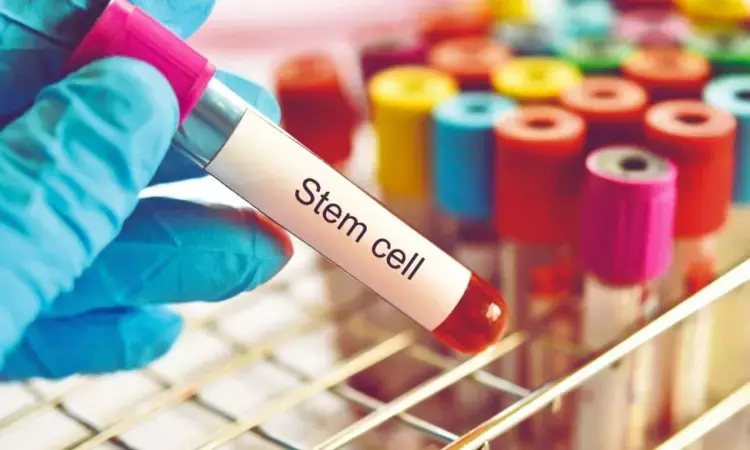- Home
- Medical news & Guidelines
- Anesthesiology
- Cardiology and CTVS
- Critical Care
- Dentistry
- Dermatology
- Diabetes and Endocrinology
- ENT
- Gastroenterology
- Medicine
- Nephrology
- Neurology
- Obstretics-Gynaecology
- Oncology
- Ophthalmology
- Orthopaedics
- Pediatrics-Neonatology
- Psychiatry
- Pulmonology
- Radiology
- Surgery
- Urology
- Laboratory Medicine
- Diet
- Nursing
- Paramedical
- Physiotherapy
- Health news
- Fact Check
- Bone Health Fact Check
- Brain Health Fact Check
- Cancer Related Fact Check
- Child Care Fact Check
- Dental and oral health fact check
- Diabetes and metabolic health fact check
- Diet and Nutrition Fact Check
- Eye and ENT Care Fact Check
- Fitness fact check
- Gut health fact check
- Heart health fact check
- Kidney health fact check
- Medical education fact check
- Men's health fact check
- Respiratory fact check
- Skin and hair care fact check
- Vaccine and Immunization fact check
- Women's health fact check
- AYUSH
- State News
- Andaman and Nicobar Islands
- Andhra Pradesh
- Arunachal Pradesh
- Assam
- Bihar
- Chandigarh
- Chattisgarh
- Dadra and Nagar Haveli
- Daman and Diu
- Delhi
- Goa
- Gujarat
- Haryana
- Himachal Pradesh
- Jammu & Kashmir
- Jharkhand
- Karnataka
- Kerala
- Ladakh
- Lakshadweep
- Madhya Pradesh
- Maharashtra
- Manipur
- Meghalaya
- Mizoram
- Nagaland
- Odisha
- Puducherry
- Punjab
- Rajasthan
- Sikkim
- Tamil Nadu
- Telangana
- Tripura
- Uttar Pradesh
- Uttrakhand
- West Bengal
- Medical Education
- Industry
Umbilical Cord Stem Cell Therapy Shows Promise in Type 2 Diabetes Management, Study Finds

Malaysia: A recent retrospective study published in Diabetes, Metabolic Syndrome and Obesity sheds light on the promising role of umbilical cord-derived mesenchymal stem cells (UC-MSCs) as a novel therapeutic approach in managing type 2 diabetes mellitus (T2DM). The research, conducted by Dr. Sze-Piaw Chin and colleagues from Cytopeutics Sdn Bhd, Cyberjaya, Malaysia, aimed to evaluate the clinical safety and efficacy of intravenous allogeneic UC-MSCs infusion in individuals diagnosed with T2DM.
T2DM is a complex metabolic disorder characterized by persistent insulin resistance, hyperglycemia, and chronic low-grade systemic inflammation. These pathophysiological features often contribute to progressive multi-organ complications, including liver dysfunction, kidney impairment, and hormonal imbalances. While conventional antidiabetic medications focus on blood glucose control, emerging interest in regenerative medicine is paving the way for cell-based therapies that target the underlying disease mechanisms.
The study analyzed data from Cytopeutics’ registry, including 218 patients who completed six months of follow-up and 83 patients who were followed for up to twelve months after receiving intravenous infusions of 50 to 100 million allogeneic UC-MSCs. Researchers assessed a wide spectrum of clinical indicators such as glycemic parameters (HbA1c, insulin, HOMA-IR), inflammatory markers (hs-CRP), liver enzymes (ALT, GGT), kidney function (eGFR, creatinine), and sex hormone levels (testosterone in males, estradiol in females).
Key findings from the study include:
- The treatment was found to be safe and well-tolerated across all patients, with no adverse effects reported throughout the follow-up period.
- Glycemic control improved substantially, with significant reductions in hemoglobin A1c levels at six months and twelve months.
- Insulin levels and HOMA-IR values declined, reflecting improved insulin sensitivity.
- Reductions in ALT and GGT levels indicated a notable decrease in liver inflammation.
- Patients with elevated hs-CRP levels experienced marked improvements, particularly evident at the 12-month follow-up, suggesting reduced systemic inflammation.
- Hormonal assessments showed increased testosterone levels in men and elevated estradiol in women, supporting better metabolic and endocrine balance.
- Improvements in kidney function were observed in patients with early-stage chronic kidney disease, with increased eGFR and decreased serum creatinine levels.
The authors concluded that UC-MSCs infusion holds substantial therapeutic potential in T2DM management, addressing hyperglycemia and related systemic inflammation, liver dysfunction, hormonal imbalances, and early kidney impairment. They advocate for further large-scale, randomized controlled trials to validate these encouraging results and explore the long-term benefits of this regenerative strategy.
"The study adds to the growing interest in stem cell-based interventions as adjunctive therapies in diabetes care, potentially transforming clinical outcomes for millions living with T2DM," the authors wrote.
Reference:
Chin SP, Kee LT, Mohd MA, Then KY. Umbilical Cord-Derived Mesenchymal Stem Cells Infusion in Type 2 Diabetes Mellitus Patients: A Retrospective Cytopeutics’ Registry Study. Diabetes Metab Syndr Obes. 2025;18:1643-1659 https://doi.org/10.2147/DMSO.S507801
Dr Kamal Kant Kohli-MBBS, DTCD- a chest specialist with more than 30 years of practice and a flair for writing clinical articles, Dr Kamal Kant Kohli joined Medical Dialogues as a Chief Editor of Medical News. Besides writing articles, as an editor, he proofreads and verifies all the medical content published on Medical Dialogues including those coming from journals, studies,medical conferences,guidelines etc. Email: drkohli@medicaldialogues.in. Contact no. 011-43720751


